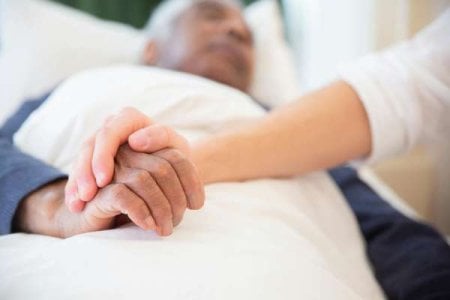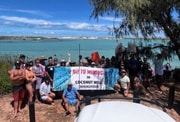Patients share heart-wrenching pleas for changes in their healthcare system
By
Danielle F.
- Replies 10
The Australian healthcare system has been an important cornerstone of the government.
However, a crisis has been unfolding in one of the country's remote areas.
In the vast and rugged expanse of Western Australia's Pilbara region, local health services have raised the alarm.
Immunocompromised elders—many of whom are Indigenous Australians—have been at grave risk due to overcrowded living conditions.
The situation has been dire for those who must travel to Newman for essential renal dialysis treatment but find themselves without a safe place to stay.
The Puntukurnu Aboriginal Medical Service (PAMS) in Newman has been offering four dialysis chairs and serves about 96 patients each month.
Yet, the clinic's capacity has been overshadowed by the lack of accommodation for travelling patients.

For 58-year-old Peggy Peterson, the journey for life-saving dialysis treatment is a thrice-a-week ordeal.
After enduring a restless night in a two-bedroom house with ten other people, she found her solace in the hum of the dialysis machine.
'Sometimes I can't get any sleep,' she admitted.
The overcrowded conditions are more than just uncomfortable; they pose significant health risks for those already battling chronic illnesses.
The plight of these patients has been a reflection of a broader systemic issue.
Indigenous leaders and health workers have been calling for a $9 million investment from state and federal governments to build a short-stay hostel in Newman.
The hostel could serve as a safe haven for patients like Peggy, who desperately need rest and recovery as part of their treatment.
The need for a hostel has been underscored by PAMS' chief executive, Robby Chibawe.
Chibawe recounted finding an elder sleeping at a football oval just a stone's throw from the clinic.
'Just because they have got no house in Newman if they don't dialyse, they die,' he said.
'So, they opt to sleep on the street.'
Aboriginal and Torres Strait Islander people are nearly four times more likely to die from chronic kidney disease than other Australians.
In the Great Sandy Desert surrounding Newman, the average life expectancy for the Martu people is between 40 and 45 years old.
Overcrowded homes also contribute to the spread of preventable diseases like impetigo, scabies, and trachoma.
'We're trying to avoid being a band-aid…a repair shop,' Chibawe explained.
'Come here, we fix you, but go back to the same place where you got the infection from—that's not sustainable.'
'If we want equitable health, then we have to put money where there is entrenched disadvantage,' he concluded.
Ironically, Newman has been sitting on the immense wealth generated by the mining industry.
Multinational giant BHP has been extracting millions of tonnes of iron ore annually, contributing around $24 billion to its coffers.
Despite owning over a thousand homes in Newman, many remain boarded up and uninhabitable.
BHP acknowledged its role in easing housing pressures and has made contributions towards PAMS' dialysis unit and the renal hostel project. However, the call for action continues.
For Peggy Peterson, the brief respites back in Jigalong, where she could embrace community life and be with her grandchildren, are cherished moments.
They remind her of a time before her survival was tethered to a machine.
'We are the Indigenous people of Australia—we should have the right to ask for things that we need for our health,' she asserted.
'We need a hostel so that we can get some good nights' sleep and we get rested.'
The call for a renal hostel in Newman goes beyond comfort; it's a demand for dignity, the right to health, and the recognition of deep-seated inequities in healthcare.

Have you or someone you know faced similar challenges in accessing healthcare in remote areas? Let us know in the comments below, and let's raise awareness together for the urgent need for better facilities and care.
However, a crisis has been unfolding in one of the country's remote areas.
In the vast and rugged expanse of Western Australia's Pilbara region, local health services have raised the alarm.
Immunocompromised elders—many of whom are Indigenous Australians—have been at grave risk due to overcrowded living conditions.
The situation has been dire for those who must travel to Newman for essential renal dialysis treatment but find themselves without a safe place to stay.
The Puntukurnu Aboriginal Medical Service (PAMS) in Newman has been offering four dialysis chairs and serves about 96 patients each month.
Yet, the clinic's capacity has been overshadowed by the lack of accommodation for travelling patients.

Dialysis patients in Pilbara had to find ways for their accommodations post-treatment. Image Credit: Pexels/Kampus Production
For 58-year-old Peggy Peterson, the journey for life-saving dialysis treatment is a thrice-a-week ordeal.
After enduring a restless night in a two-bedroom house with ten other people, she found her solace in the hum of the dialysis machine.
'Sometimes I can't get any sleep,' she admitted.
The overcrowded conditions are more than just uncomfortable; they pose significant health risks for those already battling chronic illnesses.
The plight of these patients has been a reflection of a broader systemic issue.
Indigenous leaders and health workers have been calling for a $9 million investment from state and federal governments to build a short-stay hostel in Newman.
The hostel could serve as a safe haven for patients like Peggy, who desperately need rest and recovery as part of their treatment.
The need for a hostel has been underscored by PAMS' chief executive, Robby Chibawe.
Chibawe recounted finding an elder sleeping at a football oval just a stone's throw from the clinic.
'Just because they have got no house in Newman if they don't dialyse, they die,' he said.
'So, they opt to sleep on the street.'
Aboriginal and Torres Strait Islander people are nearly four times more likely to die from chronic kidney disease than other Australians.
In the Great Sandy Desert surrounding Newman, the average life expectancy for the Martu people is between 40 and 45 years old.
Overcrowded homes also contribute to the spread of preventable diseases like impetigo, scabies, and trachoma.
The proposed hostel could provide temporary relief for patients and serve as a stepping stone in addressing the housing shortages in the region.'We're trying to avoid being a band-aid…a repair shop,' Chibawe explained.
'Come here, we fix you, but go back to the same place where you got the infection from—that's not sustainable.'
'If we want equitable health, then we have to put money where there is entrenched disadvantage,' he concluded.
Ironically, Newman has been sitting on the immense wealth generated by the mining industry.
Multinational giant BHP has been extracting millions of tonnes of iron ore annually, contributing around $24 billion to its coffers.
Despite owning over a thousand homes in Newman, many remain boarded up and uninhabitable.
BHP acknowledged its role in easing housing pressures and has made contributions towards PAMS' dialysis unit and the renal hostel project. However, the call for action continues.
For Peggy Peterson, the brief respites back in Jigalong, where she could embrace community life and be with her grandchildren, are cherished moments.
They remind her of a time before her survival was tethered to a machine.
'We are the Indigenous people of Australia—we should have the right to ask for things that we need for our health,' she asserted.
'We need a hostel so that we can get some good nights' sleep and we get rested.'
The call for a renal hostel in Newman goes beyond comfort; it's a demand for dignity, the right to health, and the recognition of deep-seated inequities in healthcare.
Key Takeaways
- Immunocompromised elders in Western Australia's Pilbara region are at risk due to overcrowded homes.
- Many renal dialysis patients must travel long distances to the mining town of Newman and lack suitable accommodation.
- Indigenous leaders and health workers have been advocating for $9 million in funding to build a short-stay hostel for dialysis patients.
- The mining company BHP has acknowledged its part in easing housing pressures and has contributed resources to a renal hostel project.







